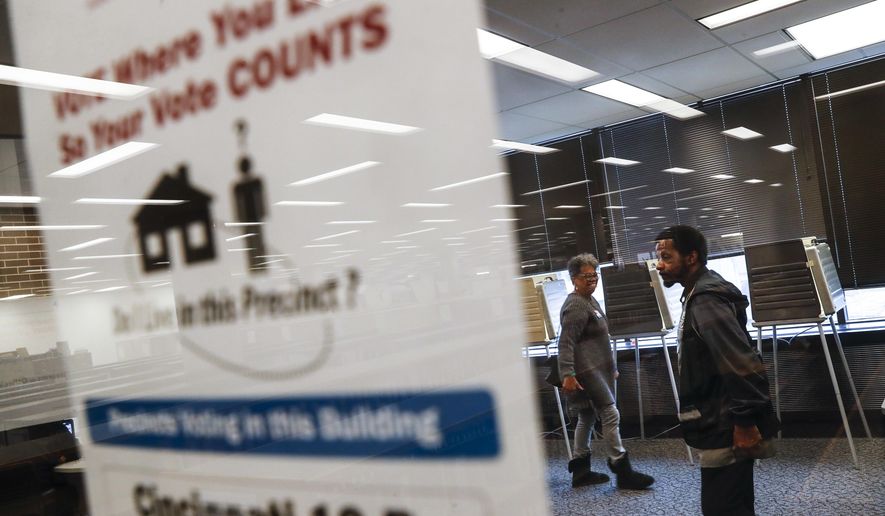States have a legal duty to clean up their voter rolls, the Supreme Court said Monday in a decision upholding Ohio’s particularly proactive approach to deleting people it suspects have moved out of a district.
The ruling is already boosting conservative groups pushing to have other states clean up their voter rolls, but drew condemnation from voting-rights activists who said they feared states would target minorities for removal.
Justice Samuel A. Alito Jr., writing the majority opinion in the 5-4 ruling, said the court wasn’t taking a position on whether cleaning the rolls was a good policy.
But he said a 1993 law clearly says states are supposed to do it, and Ohio’s process — which allows people to be removed if they haven’t voted in six years, and fail to return a notice saying they will be removed — is legal.
“We have no authority to second-guess Congress or to decide whether Ohio’s Supplemental Process is the ideal method for keeping its voting rolls up to date,” Justice Alito wrote. “The only question before us is whether it violates federal law. It does not.”
He also seemed to side with those who say the potential for voting fraud exists, citing statistics that show some 2.75 million people are listed in two different states at the same time, and a total of 24 million names — about one out of every eight names on registrars’ lists nationwide — have some major inaccuracy.
Ohio’s law flagged voters who didn’t vote in a federal election. They were sent a notice asking if they were still living at the address they gave. If they didn’t respond to the notice, and didn’t vote in either of the next two federal elections, they were deemed inactive and stripped.
The legal battle boiled down to competing visions of what Congress had intended when it wrote the Motor Voter law in 1993.
Voting rights activists said the point of the law was to expand voting rolls, and they said efforts to trim the lists should be viewed skeptically.
They pointed to part of the law that said failing to vote can’t be the sole reason someone is stripped from the rolls.
But Ohio’s plan passes muster, wrote Justice Alito, joined by the court’s four other Republican-appointed members.
He said the failure to vote acted in concert with the failure to return the notification card — a stamped, pre-addressed card the state sent out. He said all someone had to do was send that back to remain on the rolls — a “simple and easy step.”
The four Democratic-appointed justices, who all dissented, warned the hectic pace of life — or a mailbox overflowing with junk mail — could thwart those plans.
Justice Stephen G. Breyer, writing the chief dissent, also put Ohio’s law in the legacy of poll taxes, literacy tests and other vestiges of Jim Crow oppression of blacks in America.
He acknowledged the complicated wording of the federal law, and even included a copy in an appendix to his opinion, urging Americans to read it for themselves so they could see Congress’s goals in enacting Motor Voter.
Justice Sonia Sotomayor, writing a separate dissent, accused the court of ignoring “the history of voter suppression” she said led to Motor Voter in the first place.
“Communities that are disproportionately affected by unnecessarily harsh registration laws should not tolerate efforts to marginalize their influence in the political process, nor should allies who recognize blatant unfairness stand idly by,” she wrote.
Civil rights groups were enraged by the ruling.
“The Supreme Court got this one wrong,” said Chris Carson, president of the League of Women Voters. “This decision will fuel the fire of voter suppressors across the country who want to make sure their chosen candidates win reelection — no matter what the voters say.”
The ruling is likely to get an early test in several ongoing tests over whether states must divulge their efforts to strip self-reported non-citizens from voting rolls.
The Public Interest Legal Foundation has been battling localities from Houston to Orange County, California, to try to get a look at how many non-citizens they’ve had to cancel — some of them after they even managed to cast votes.
Some localities have refused to turn over records, saying the point of Motor Voter was to build lists, and only groups that want to register more voters are entitled to see records.
Monday’s ruling — and particularly a concurring opinion by Justice Clarence Thomas — show those localities have got it wrong, said PILF President J. Christian Adams.
“Today’s ruling empowers local officials and concerned parties to utilize the NVRA to ensure the most accurate and reliable voter rolls possible,” Mr. Adams said.
• Stephen Dinan can be reached at sdinan@washingtontimes.com.




Please read our comment policy before commenting.